Related Research Articles

Micronesia is a subregion of Oceania, consisting of about 2,000 small islands in the Northwestern Pacific Ocean. It has a close shared cultural history with three other island regions: Maritime Southeast Asia to the west, Polynesia to the east, and Melanesia to the south—as well as with the wider community of Austronesian peoples.

Palau, officially the Republic of Palau, is an island country in the Micronesia subregion of Oceania in the western Pacific. The republic consists of approximately 340 islands and connects the western chain of the Caroline Islands with parts of the Federated States of Micronesia. It has a total area of 466 square kilometers (180 sq mi), making it one of the smallest countries in the world. The most populous island is Koror, home to the country's most populous city of the same name. The capital Ngerulmud is located on the largest island of Babeldaob, in Melekeok State. Palau shares maritime boundaries with international waters to the north, the Federated States of Micronesia to the east, Indonesia to the south, and the Philippines to the northwest.

Vanuatu's economy is primarily agricultural; 80% of the population is engaged in agricultural activities that range from subsistence farming to smallholder farming of coconuts and other cash crops.

A tuna is a saltwater fish that belongs to the tribe Thunnini, a subgrouping of the Scombridae (mackerel) family. The Thunnini comprise 15 species across five genera, the sizes of which vary greatly, ranging from the bullet tuna up to the Atlantic bluefin tuna, which averages 2 m (6.6 ft) and is believed to live up to 50 years.

Sardine and pilchard are common names for various species of small, oily forage fish in the herring family Clupeidae. The term 'sardine' was first used in English during the early 15th century; a somewhat dubious folk etymology says it comes from the Italian island of Sardinia, around which sardines were once supposedly abundant.

Grimsby or Great Grimsby is a port town and the administrative centre of North East Lincolnshire, Lincolnshire, England. Grimsby adjoins the town of Cleethorpes directly to the south-east forming a conurbation. Grimsby is 45 mi (72 km) north-east of Lincoln, 33 mi (53 km) south-south-east of Hull, 28 mi (45 km) south-east of Scunthorpe, 50 mi (80 km) east of Doncaster and 80 mi (130 km) south-east of Leeds. In 2021 it had a population of 86,138.
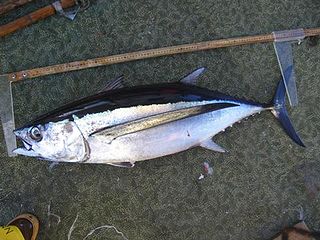
The albacore, known also as the longfin tuna, is a species of tuna of the order Scombriformes. It is found in temperate and tropical waters across the globe in the epipelagic and mesopelagic zones. There are six distinct stocks known globally in the Atlantic, Pacific, and Indian oceans, as well as the Mediterranean Sea. The albacore has an elongate, fusiform body with a conical snout, large eyes, and remarkably long pectoral fins. Its body is a deep blue dorsally and shades of silvery white ventrally. Individuals can reach up to 1.4 m in length.
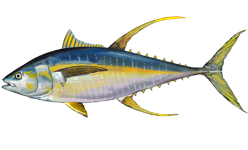
The yellowfin tuna is a species of tuna found in pelagic waters of tropical and subtropical oceans worldwide.
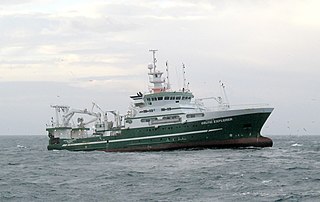
Bottom trawling is trawling along the seafloor. It is also referred to as "dragging". The scientific community divides bottom trawling into benthic trawling and demersal trawling. Benthic trawling is towing a net at the very bottom of the ocean and demersal trawling is towing a net just above the benthic zone. Bottom trawling can be contrasted with midwater trawling, where a net is towed higher in the water column. Midwater trawling catches pelagic fish such as anchovies and mackerel, whereas bottom trawling targets both bottom-living fish (groundfish) and semi-pelagic species such as cod, squid, shrimp, and rockfish.

The South Seas Mandate, officially the Mandate for the German Possessions in the Pacific Ocean Lying North of the Equator, was a League of Nations mandate in the "South Seas" given to the Empire of Japan by the League of Nations following World War I. The mandate consisted of islands in the north Pacific Ocean that had been part of German New Guinea within the German colonial empire until they were occupied by Japan during World War I. Japan governed the islands under the mandate as part of the Japanese colonial empire until World War II, when the United States captured the islands. The islands then became the United Nations–established Trust Territory of the Pacific Islands governed by the United States. The islands are now part of Palau, the Northern Mariana Islands, the Federated States of Micronesia, and the Marshall Islands.

The Economy of the Empire of Japan refers to the period in Japanese economic history in Imperial Japan that began with the Meiji Restoration in 1868 and ended with the Surrender of Japan in 1945 at the end of World War II. It was characterized by a period of rapid industrialization in the late nineteenth and early twentieth centuries, and the dominance of a wartime economy from 1938 to 1945.
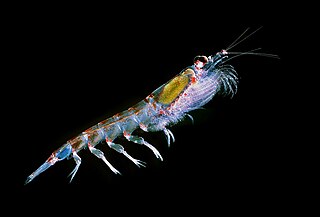
The krill fishery is the commercial fishery of krill, small shrimp-like marine animals that live in the oceans world-wide. The present estimate for the biomass of Antarctic krill is 379 million tonnes. The total global harvest of krill from all fisheries amounts to 150–200,000 tonnes annually, mainly Antarctic krill and North Pacific krill.

Shark finning is the act of removing fins from sharks and discarding the rest of the shark back into the ocean. This act is prohibited in many countries. The sharks are often still alive when discarded, but without their fins. Unable to swim effectively, they sink to the bottom of the ocean and die of suffocation or are eaten by other predators. Shark finning at sea enables fishing vessels to increase profitability and increase the number of sharks harvested, as they must only store and transport the fins, by far the most profitable part of the shark; the shark meat is bulky to transport. Many countries have banned this practice and require the whole shark to be brought back to port before removing the fins.

China has one-fifth of the world's population and accounts for one-third of the world's reported fish production as well as two-thirds of the world's reported aquaculture production. It is also a major importer of seafood and the country's seafood market is estimated to grow to a market size worth US$53.5 Billion by 2027.

As with other countries, the 200 nautical miles (370 km) exclusive economic zone (EEZ) off the coast of the United States gives its fishing industry special fishing rights. It covers 11.4 million square kilometres, which is the second largest zone in the world, exceeding the land area of the United States.

A shark sanctuary is an area that forbids commercial fishing operations from targeting and retaining caught sharks, including their fins. The first shark sanctuary was created by Palau in 2009. It was followed by Maldives, Honduras, The Bahamas and Tokelau.
The Nauru Agreement Concerning Cooperation in the Management of Fisheries of Common Interest, or The Nauru Agreement is an Oceania subregional agreement between the Federated States of Micronesia, Kiribati, the Marshall Islands, Nauru, Palau, Papua New Guinea, Solomon Islands and Tuvalu. The eight signatories collectively control 25–30% of the world's tuna supply and approximately 60% of the western and central Pacific tuna supply.
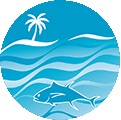
The Pacific Islands Forum Fisheries Agency (FFA) is an intergovernmental agency established in 1979 to facilitate regional co-operation and co-ordination on fisheries policies between its member states in order to achieve conservation and optimum utilisation of living marine resources, in particular highly migratory fish stocks, for the benefit of the peoples of the region, in particular the developing countries. The office campus is located in Honiara, Solomon Islands

Diplomatic relations are maintained between Japan and Palau, a small island country in the western Pacific Ocean that was once a Japanese colony. There is a Japanese embassy on the Palauan island of Koror and a Palauan embassy in Tokyo.
The 45th Pacific Islands Forum was held from 29 July to 1 August 2014 in Palau. The forum's official opening was held in the capital Ngerulmud, in Melekeok State, but the majority of events were held in Koror, Palau's largest city and former capital. The official theme of the meeting was "The Ocean: Life & Future". Topics under discussion include climate change, commercial fishing, non-communicable diseases and the possibility of readmitting Fiji to the forum.
References
- ↑ South Pacific Commission; Secretariat of the Pacific Community (2007). Fisheries newsletter. South Pacific Commission. Retrieved 16 July 2012.
- 1 2 Cook, Ben (17 August 2010). Micronesia and Palau (Other Places Travel Guide). Other Places Publishing. p. 210. ISBN 978-0-9822619-3-4 . Retrieved 16 July 2012.



